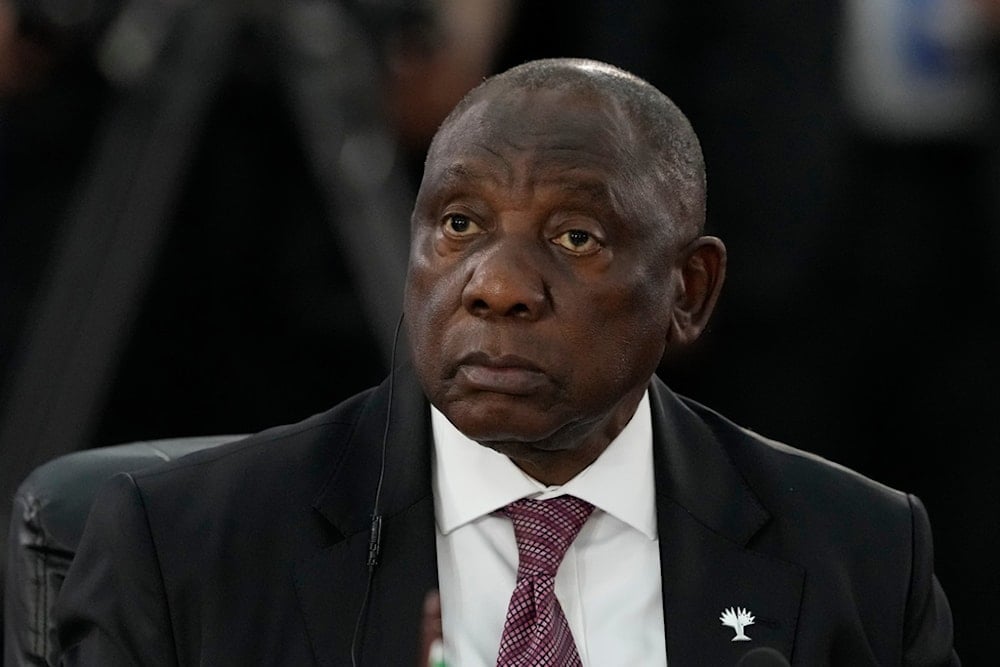Ramaphosa rebukes Trump over US boycott of G20 summit in Johannesburg
South African President Cyril Ramaphosa condemned Donald Trump's decision to boycott the upcoming G20 summit over debunked claims of white persecution, insisting the meeting will proceed and the US is only diminishing its own influence.
-

FILE - South Africa's President Cyril Ramaphosa attends the 17th annual BRICS summit in Rio de Janeiro, Sunday, July 6, 2025 (AP Photo/Eraldo Peres, file)
South African President Cyril Ramaphosa has criticized US President Donald Trump for refusing to participate in the upcoming G20 leaders summit, warning that attempts to isolate the host nation will have little effect on the gathering or its outcomes.
Trump announced that neither he nor any US officials would travel to Johannesburg for the 22–23 November meeting, arguing that South Africa should not be hosting the summit at all. He justified the boycott by repeating widely debunked allegations that white South Africans face systematic persecution.
In an online post, Trump described it as a "total disgrace" that South Africa was presiding over this year’s G20 and said he would dispatch Vice-President JD Vance in his place. He has since escalated his claims, insisting that "Afrikaners are being killed and slaughtered, and their land and farms are being illegally confiscated" and that "No US government official will attend as long as these human rights abuses continue."
Boycott Fallout
South African officials have repeatedly rejected these assertions, noting that the narrative of a so-called "white genocide" has been discredited by researchers, rights groups, and law enforcement data. The government also maintains that no white farmers have had land taken without compensation.
Ramaphosa’s pushback, however, comes against a broader geopolitical backdrop. Pretoria’s high-profile case accusing "Israel" of genocide at the International Court of Justice has elevated South Africa’s visibility on the world stage but has also intensified friction with Washington and its allies. Analysts say the timing of Trump’s remarks, and the revival of long-standing racialized conspiracy theories about South Africa, reflects an effort by sections of the US political right to delegitimize Pretoria internationally, especially as it asserts itself in global debates over Gaza, multipolarity, and Global South leadership.
The rhetoric mirrors another trend unfolding on the continent, where US officials and conservative media figures have recently amplified allegations of large-scale religious killings in Nigeria. Abuja has rejected these claims as exaggerated or politically motivated, accusing segments of the US establishment of exploiting local tensions to stir instability and pressure the government over its growing ties with non-Western powers. Commentators say the parallel narratives, of “Muslims killing Christians” in Nigeria and “Black South Africans targeting white farmers”, rely on similar tropes portraying African states as chaotic and morally compromised. Both have emerged at moments when African governments are asserting greater diplomatic independence from Washington.
Speaking to reporters outside parliament, Ramaphosa dismissed the US withdrawal. Quoted by AFP, he said "boycott politics doesn’t work", adding that Washington’s absence would not hinder the summit’s agenda. "Absence is their loss," he said, emphasizing that the US is "giving up the very important role that they should be playing as the biggest economy in the world."
South Africa holds this year’s rotating G20 presidency, and the November gathering will mark the first time the summit is convened on African soil. Each year, the host nation sets the priorities and themes for discussions among the world’s leading economies. The United States is expected to assume the presidency after South Africa.
Summit Strain
Trump is not the only leader signaling he will not attend. Argentina’s President Javier Milei, a close political ally of Trump, is also expected to skip the event and send his foreign minister, Pablo Quirno, instead, AFP reported.
Despite the controversy, South African officials say preparations for the summit remain on track and that participation by other G20 members has not been affected.
Read more: US slashes refugee admissions, but prioritizes white South Africans

 4 Min Read
4 Min Read










